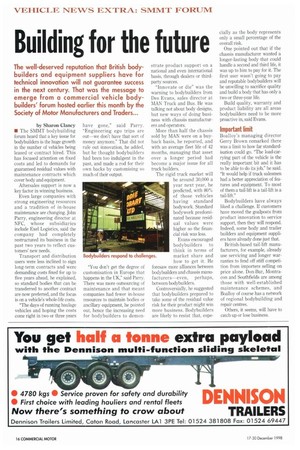Building for the future
Page 18

If you've noticed an error in this article please click here to report it so we can fix it.
The well-deserved reputation that British bodybuilders and equipment suppliers have for technical innovation will not guarantee success in the next century. That was the message to emerge from a commercial vehicle bodybuilders' forum hosted earlier this month by the Society of Motor Manufacturers and Traders...
by Sharon Clancy • The SMMT bodybuilding forum heard that a key issue for bodybuilders is the huge growth in the number of vehicles being leased or contract hired. This has focused attention on fixed costs and led to demands for guaranteed residual values with maintenance contracts which cover body and equipment.
Aftersales support is now a key factor in winning business.
Even large companies with strong engineering resources and a tradition of in-house maintenance are changing. John Parry, engineering director at NFC, whose subsidiaries include Exel Logistics, said the company had completely restructured its business in the past two years to reflect customers' new needs.
Transport and distribution users were less inclined to sign long-term contracts and were demanding costs fixed for up to five years ahead, he explained, so standard bodies that can be transferred to another contract are now preferred, and the focus is on a vehicle's whole-life costs.
"The days of running haulage vehicles and hoping the costs come right in two or three years have gone," said Parry. "Engineering ego trips are out—we don't have that sort of money anymore." That did not rule out innovation, he added, but he thought bodybuilders had been too indulgent in the past, and made a rod for their own backs by customising so much of their output.
"You don't get the degree of customisation in Europe that happens in the UK," said Parry. There was more outsourcing of maintenance and that meant companies had fewer in-house resources to maintain bodies or ancillary equipment, he pointed out, hence the increasing need for bodybuilders to demon strate product support on a national and even international basis, through dealers or thirdparty sources.
"Innovate or die" was the warning to bodybuilders from Des Evans, sales director at MAN Truck and Bus. He was talking not about body designs, but new ways of doing business with chassis manufacturers and operators.
More than half the chassis sold by MAN were on a buyback basis, he reported, and with an average fleet life of 42 months, managing that asset over a longer period had become a major issue for all truck builders.
The rigid truck market will be around 30,000 a year next year, he predicted, with 80% of those vehicles having standard bodywork. Standard bodywork predominated because residual values were higher so the financial risk was less.
Evans encouraged bodybuilders to think in terms of market share and how to get it. He foresaw more alliances between bodybuilders and chassis manufacturers—even, perhaps, between bodybuilders.
Controversially, he suggested that bodybuilders prepared to take some of the residual value risk for their product might win more business. Bodybuilders are likely to resist that, espe
cially as the body represents only a small percentage of the overall risk.
One pointed out that if the chassis manufacturer wanted a longer-lasting body that could handle a second and third life, it was up to him to pay for it. The first user wasn't going to pay and reputable bodybuilders will be unwilling to sacrifice quality and build a body that has only a two or three-year life.
Build quality, warranty and product liability are all areas bodybuilders need to be more proactive in, said Evans.
Important limit
Boalloy's managing director Gerry Brown remarked there was a limit to how far standardisation could go. "The load-carrying part of the vehicle is the really important bit and it has to be able to do its job," he said. "It would help if truck salesmen had a better appreciation of features and equipment. To most of them a tail-lift is a tail-lift is a tail-lift."
Bodybuilders have always liked a challenge. If customers have moved the goalposts from product innovation to service support, then they will respond. Indeed, some body and trailer builders and equipment suppliers have already done just that.
British-based tail-lift manufacturers, for example, already use servicing and longer warranties to fend off stiff competition from importers selling on price alone. Don-Bur, Montracon and Southfields are among those with well-established maintenance schemes, and Boalloy of course has a network of regional bodybuilding and repair centres.
Others, it seems, will have to catch up or lose business.












































































































































